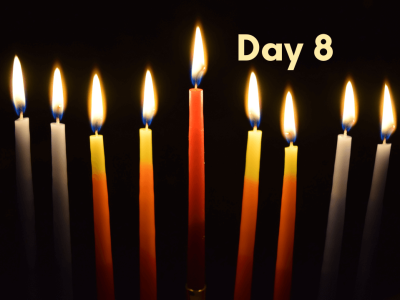A Rabbi, a Muslim, and Me
A Rabbi, a Muslim, and Me
What do you get when you put a Rabbi, a Muslim and a Messianic pastor in one place? The same thing you get when you put a lion, a tiger, and a bear in one cage with one piece of meat: the potential for a free-for-all wrestling match! That’s pretty much what’s happening around here.

Ever since I got here I have been dialoguing with a Jewish rabbi. He’s an Ethiopian Jew and is very learned. He speaks Hebrew fluently and studies ALL DAY on Shabbat; the guy is like a Jewish Energizer bunny! He just keeps going and going and going! Many times I jump in on his studies like I did today. My intention is to learn more about him and his perspective and hope that he’ll learn from mine.
At the beginning of our relationship, we went head-first for over three hours about the nature of the Godhead. And every time I thought I had him pinned down with no way out, he would throw his hands up and say, “It can’t be, because there is only one God!” It was like he could not hear anything I was saying no matter how eloquently I said it, like there was a brick wall in his brain that I could not climb over no matter how high a ladder I put against it. After three hours, I felt like beating my head against a brick wall. I just couldn’t take it anymore. It was the most fruitlessly insane, stubborn conversation I had ever had with a human being. I say and prove that the tree is green and he says it’s orange. I say that the pumpkin is orange and he says, “No, the sages say that it is green.” In every attempt at logical conversation, I ended up being the one who found myself saying, “Oy Vey!” So for over four months, I decided I wasn’t going to talk to him. There isn’t enough Tylenol in this place to cover me for such an expedition. Then something happened.
One day in the middle of August, BL and I were in the craft room talking. I had received a new book that was sitting in front of me. The rabbi saw the book and commented on it. I told him it was another Torah Portion book on Bereshit (Genesis). He was intrigued. He started to flip through it and then he saw a passage from Luke. He started laughing and joking around about the New Testament and stuff. I rolled my eyes and decided I was not going to take the bait and end up on another three-hour tour with Gilligan. I had made that mistake before. Then he had to go and ask me a theological question. Dang it! Like a mouse that just can’t resist that piece of cheese even though he knows it’s sitting in a trap, I fell for it. Ugh. The next thing I knew, I was corralled in another battle, begging (in my mind) for Yeshua to come back and settle it once and for all. But incredibly, this conversation was way different than the others had been.
There was a complete shift in the conversation from the tone and temperament we’d had four months earlier. We were both calm and he was very receptive to what I had to say. This time I was praying the entire time he was talking and BL was across the table praying as well. I had no agenda, no PowerPoint, no notes…just the Ruach. And the Ruach took over completely. I showed him in the Psalms how the Mashiach was in the heavens with Yahweh and even the one talking in spots, how Yahweh said His Mashiach was going to be King of Israel and that He was prophesied to be from Bethlehem. I took him to Daniel where it says that the Mashiach was going to be “cut off” 483 years after the decree of the king and that alone proves that the Messiah had to have come before the destruction of the second temple in 70 AD. He tracked with me through every scripture, even those I had never used before. He was ready for Isaiah 53 and others that are popular for Christians to use with Jews. But he was not ready to see a real living Messiah sitting at the right hand of Yahweh, alive and well in the Heavens and prophesied to come to earth. This rattled his cage a bit. He actually said that it’s possible that Yeshua could be Messiah but that it’s not for us to know. Well, at least we were making a little headway, anyway.
Everything was going amazingly well. I was blown away that he was so quiet, conceding everything I said. And then BL brought up the virgin birth. That is the worst possible subject to bring up with a Jew. They’re trained in how to deal with that and I knew it. He laughed – hard – and started mocking the idea. I put my hand to my forehead knowing that all the progress we were making was about to stall. Amazingly, though, the Holy Spirit took over and immediately drove that topic back up the mountain of truth from which I thought we were tumbling. He was mocking how insane an idea it was that Yahweh would impregnate a woman and even called it possible rape. But for the first time when it came to this topic, I was flooded with responses. I asked, “Rabbi, what’s more absurd? Hashem overshadowing a woman and creating a human from another human or creating a human from dirt? What’s more insane? Creating a child inside a womb without the use of a husband or parting the Red Sea? Making bread fall from heaven, making walls come down with just some marching and blowing some trumpets, or making an entire woman out of just a rib taken from a man?” His smirk quickly disappeared and he conceded that a virgin birth was, in fact, possible. Then I heard BL mention something about the Nephilim and how they entered the daughters of men. That was all I needed to seal the deal. I jumped in and said, “That’s a great example! If fallen angels, who were there at creation and knew all the secrets and science of the human body, can somehow plant their DNA inside a woman when they have no procreation parts, how much MORE can the Creator of the angels do the same thing to Mary?” The rabbi was silent. The Ruach had just shattered his entire paradigm. This story WAS possible; he had just never thought through it like this. He was so used to what he had been taught about it that he had never actually thought through just how logical and likely it was. The room was silent. I’m pretty sure it was like the part in Revelation where it says there was silence in heaven for about a half hour. It was that kind of moment.
When he left three hours later, BL and I kept talking. I was astounded at what had just happened. I told him that I couldn’t understand what the difference was. I had told him virtually all the same things months ago and he couldn’t hear a word of it. BL made a powerful statement that rocked my world. He said, “Pastor, what’s changed is you. You were led by the Spirit this time and you did it His way, not yours.” I paused for a moment and looked down to ponder his statement. Then I saw it. He was right. I didn’t come with any agenda and I didn’t care about “converting” him anymore or being right. It wasn’t about right and wrong. It was about “seeing God.” Remember that article? This was the real-time practice of what I had learned months ago. I actually cared about him seeing the truth rather than me being right about the truth. And that is a BIG difference.
People can tell a difference between when you care and when you’re just trying to win. They can sense the motive and agenda before you even open your mouth. Where before I didn’t really know the Rabbi very well and all he saw was that I was attacking the very framework and foundation of Judaism, this time I had a relationship with him and he knew I wasn’t trying to convert him. He could “feel” something, and that something relaxed him and left him feeling unthreatened just enough to hear what I was saying. It also allowed me to hear what he was saying.
How many times do we miss opportunities to share our faith with someone in a very effective way because we put theology over relationships? I’ve discovered that the old saying is definitely still true: People don’t care how much you know until they know how much you care. When I remained calm, complimented him, and told him how much I appreciated our talks and his perspective, he remained calm and said the same about me. Our conversations have turned into learning sessions about each other and we’ve both grown spiritually and learned more because of it. My motive is no longer to get him to see “my side.” My motive is to help him to understand me more. Understanding each other brings mutual respect and the ability to change our beliefs and adjust to the truth if need be. I am no longer trying to prove my side right and his wrong. I take my time explaining to him why I believe what I believe about a topic which makes him interested because there’s no threat. He doesn’t have to do anything. Once he realized that and I told him that even if he adopted my entire belief system it would not change anything about the way he practiced his faith, there was instant relief. He always felt that if he ever accepted Jesus that he would have to give up Judaism. This made me realize that this is the real reason why people don’t really want to talk theology or argue about faith or learn the deeper things of the Word. Fear. People are afraid of change. Once fear was out of the way, he was far more receptive.
So although he’s still stubborn and often returns to the same dogma and canned “This is how we’ve always done it and I have a responsibility as a rabbi to blah, blah, blah…,” it doesn’t really bother me anymore because I don’t have an agenda. I’ve learned to love this stubborn guy and appreciate his crazy rants about how his sect of Judaism is the most authentic and oldest in the world and how his traditions and sages did exactly what he’s doing and how he’s preserving his religion for the next generation, etc., etc., etc… Maybe because when I talk to him I feel like I’m actually in the first century talking to a Jewish rabbi. If you were a fly on the wall around here, you would quickly see in our conversations that creeds are attached to emotions, and emotions that have been set in place for decades do not get dislodged overnight. Even when the Rabbi concedes something and knows I’m right, it takes a long time to get his emotions to cross over and join his brain in concession.
Then there’s the Muslim that gets added to the equation. He just got transferred from a different prison and I met him for the first time as I was coming out of visiting. I introduced myself by my prison nickname (Preacher) and he asked if I was a real pastor. I said I was and he said he’d like to talk to me some time because he had a degree in religious studies. There was an instant connection. Over the next few days, I had a chance to spend many hours with him, hearing his story and sharing with him whatever the Spirit put on my heart.
His background is fascinating. He was a very successful clinical psychologist with a large practice in Chicago. He grew up dirt poor in the south and when his family moved north he decided he was going to be successful so that his parents would be proud of him. He graduated high school, then college, then got a master’s, a doctorate, and then another doctorate in his current field. He grew his practice to seventeen employees and was testifying in Congress when they needed a professional’s opinion and working with the wealthy. He had it made in almost every way. Then one of his managers accidentally made some major mistakes in his accounting with Medicare and they both ended up being sent to prison for Medicare fraud.
On the spiritual side, he grew up Baptist, then converted to Catholicism at age 40. He found a richness in the traditions and symbolism that the Baptists could not offer. He converted to Islam when he came to prison twenty years later. I haven’t explored how that happened yet. What’s strange is that he talks like a Christian but is walking with Muslims. I told him the other day that he’s not any of the religions of which he’s been a member. He’s on a spiritual journey to discover Truth. I shared with him how Islam has misunderstood the birthright from Abraham forward. I explained that although Ishmael was the firstborn, God had already made the proclamation that the Promise and inheritance were going to come through Sarah. So Hagar doesn’t count because the Promise of God is irrevocable and unchangeable. You would’ve thought his whole world had blown up. We talked about “Truth or Tradition,” “Identity Crisis,” and a whole host of other topics. He’s hungry to learn more and I spend time with him as much as I can. He’s a great guy and is searching for answers to his soul’s questions. What’s crazy is that back in May, Olga, who’s on our Russian translation team, had a vision of a tall black man who spoke Spanish, was wearing a middle eastern hat on his head, and was standing before her in a green uniform. She said he had walls around his mind and two chains around his heart. She saw me ministering to this man and the walls and chains falling off him. Are you ready for this? K is a tall black man who speaks Spanish, wears a middle eastern Islamic hat on his head, and wears the green inmate uniform the rest of us do. He clearly has walls around his mind, and his heart is in chains. So pray for him to be set free so the Father can accomplish His great work in this man!
Love is what causes negative emotions to shift into reverse. When we’re sharing with someone because we love them, they feel it and their emotions are on board before their mind is. That’s how the Ruach works. Did you come to accept Christ because you understood everything about Him or because He stirred your emotions? We are emotional beings. So the next time you share your faith with family and friends, ask yourself how much you’re sharing because you actually love them and how much you’re sharing to be right. Then tell yourself that you’re sharing so they understand, so you can have a better relationship with them, and so you can drop the ulterior motive of “conversion.” Not only is this a stronger position that allows you to stay in shalom, but it’s also how we’re supposed to do it to begin with.
Love your neighbor as yourself. It’s a powerful motivator.
Shalom,
Jim Staley











